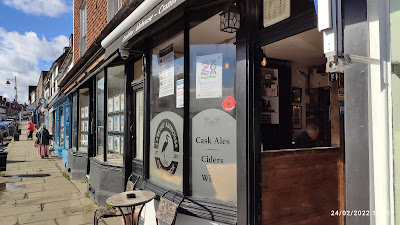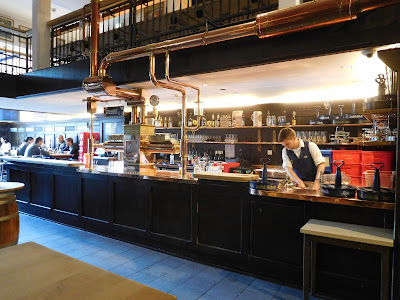Larkin’s Alehouse is located in Cranbrook, a small Wealden town that will form the main content of this post, but it’s an establishment that had long been on my list of places to visit. So, with this in mind, I set off, bus-pass in hand, to make the hour or so’s journey to this unspoilt little gem. It was raining quite heavily as I left the house, and with the small local bus that runs almost from the top of my house cancelled (the beauty of having the Arriva app on my phone), I needed to walk into Tonbridge, in order catch the Ham’s Travel service that runs, right across the Weald, to the slightly larger, and more developed town of Tenterden. Walking in the rain, reminded me that my shoes are no longer waterproof, and whilst I have a brand-new pair at home, they haven’t been broken in yet. That will be a job for later today! The rain had eased off slightly, by the time I arrived in Tunbridge Wells, and with 40 minutes before the Tenterden bus was due, I had time to call in at the bank, and then grab a cup of coffee. I always prefer an independent operator to the likes of Costa and Starbucks, and fortunately I came across one that I hadn’t before, situated a couple of minutes’ walk from the bus stop. TN1 Bar & Kitchen, is an attractive and modern bistro, offering breakfast in the morning, meals at lunchtime and evening, plus cocktails and other drinks, throughout the day. Proof of this was the font I noticed, for Meantime Beer. I was the only customer to start with, but I hadn’t been chatting long with the friendly, Turkish owner, when a few other customers appeared. The proprietor told me it was a family-run establishment that aimed to cater for local shoppers, plus visitors to the nearby Assembly Hall and Trinity Theatre. I though it a nice touch when he beckoned in a local road-sweeper, telling him to leave his cart outside, come in to escape the rain, and enjoy for a coffee. The latter was on-the-house, which I thought was a nice and very community-minded gesture. After and enjoyable and very reasonably priced flat white, I made my way to the nearby stop, and boarded the 297 Tenterden bus. I wasn’t, of course, going the full distance, but after travelling on the same service a month or so previously, I was surprised by the lack of fellow passengers. Was it the rain, or more worryingly, the threat of war that had kept them away? But we will never know, so leaving such gloomy thoughts behind, I settled down to enjoy the journey.
Any gloom was further lifted, by the appearance of the sun, breaking through the clouds, as we journeyed through the delightful villages along the way – places like Matfield, Brenchley, Horsmonden and Goudhurst. We changed drivers at the latter, and I’m still not sure how the rather rotund and slow-footed gentleman, manged to clamber into the driver’s seat and squeeze in behind the wheel. As a friend of ours would say, “He was no stranger to a fish supper,” but he was far more careful and considerate behind the wheel than the driver he replaced. The latter was rather fast for my liking and aggressive with it – perhaps he thought he was commanding one of Putin’s tanks?
We arrived at the pleasant, and some might say quaint town of Cranbrook, shortly before midday. The bus dropped me in the High Street, within sight of Larkin’s Alehouse, but with 10 minutes to opening time, and a lengthy session ahead, before the bus home, I wanted to have a look around first, and renew my acquaintance with a town I’d last visited 30 or so years ago. That visit too was quite a rare one, as Cranbrook, with its narrow and winding streets was by-passed a long time ago, so it’s not even the sort of settlement one passes through on route to somewhere else. Known as the “Capital of the Weald,” Cranbrook is a small and attractive town, which dates back to early medieval times. The town received a charter from King Edward I to hold weekly markets, and a century later, large numbers of Flemish weavers were drawn to the town, attracted by plentiful supplies of wool, from nearby Romney Marsh, as well as local deposits of fuller’s earth. The latter is a clay material, with a variety of uses, including the de-greasing of wool. This, coupled with the presence of streams that could be dammed in order to power fulling mills, led to Cranbrook becoming the centre of the Wealden cloth industry. Large “cloth halls,” capable of holding large weaving looms, were constructed, in Cranbrook, as well as the surrounding area, and this, alongside the parallel development of iron-making, led to considerable expansion of the town. Many fine buildings were built, and the Parish Church of St Dunstan, known as the “Cathedral of the Weald,” was enlarged. The town’s prosperity declined, when the wool trade and ironmaking moved to other parts of the country, most noticeably the north of England, and Cranbrook then became a centre for agriculture. The railways never properly reached the town, although the short-lived, Paddock Wood to Hawkhurst branch line, did serve nearby Hartley, between 1893 and 1961. Today, Cranbrook remains as a town that time has passed by, but this only adds to its charm, and its narrow medieval streets, lined with attractive houses, many of them constructed in typical, white-painted weatherboard, style, make it a place well worth exploring on foot, and this is what I set out to do, on Thursday. I began with a visit to St Dunstan’s church, before continuing up towards Cranbrook School, a selective, but non-fee paying, co-educational establishment, with a mixture of both boarders and day pupils. I then retraced my footsteps, and headed off in the opposite direction, to view the town’s impressive windmill. Set on a hill, overlooking north of the town, Cranbrook’s Union Mill, was constructed in 1814. It is a smock-mill, and the tallest such windmill in the country. A noticed, pinned to the door, advised that the mill would be re-opening to the public, from 1st April, and by then, the sails (or sweeps), which were conspicuous by their absence, will have been replaced. Walking back towards the town centre, I came across numerous small, and independently owned shops, cafés, and restaurants, but for a town of its size, Cranbrook appears quite poorly served by pubs. I was heading of course, for the aforementioned Larkin’s Alehouse, but on the way back, I passed the impressive, brick façade of the George, the town’s most prestigious hotel. Said to date from the 14th Century, the George has obviously been altered and enlarged over the years, and whilst I was tempted to pop in, a glance through the windows, confirmed that it wasn’t really my sort of place. According to What Pub, the George stocks up to three Shepherd Neame beers, and this was another factor in persuading me not to visit. Just across the road, and occupying a prominent corner position, is the White Horse, described by What Pub as “Cranbrook’s only true local.” The pub boasts a large, brick-built frontage, and extends upwards for three floors. It certainly looked worthy of a visit, and IF truth be known, I very nearly did. The pull of Cranbrook’s only micro-pub proved too strong though, so I will have to save that experience for another time.We’ll conclude this brief article on Cranbrook, here, and allow the next one to take a much more detailed look at Larkin’s Alehouse. After all, this establishment was the main reason for my visit to the town.



















































